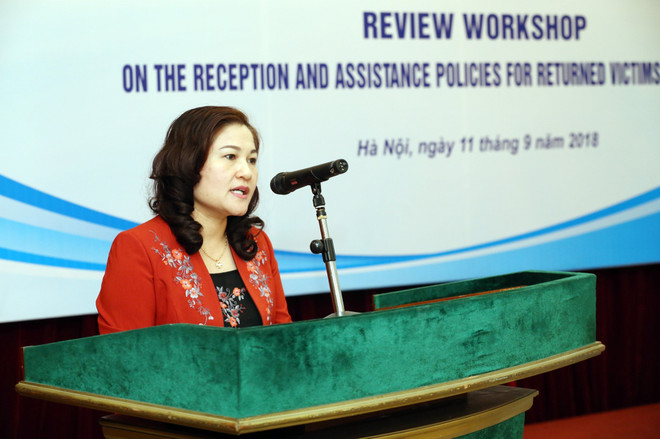 Deputy Minister of Labour, Invalids and Social Affairs Nguyen Thi Ha speaks at the workshop in Hanoi on September 11 (Photo: VNA)
Deputy Minister of Labour, Invalids and Social Affairs Nguyen Thi Ha speaks at the workshop in Hanoi on September 11 (Photo: VNA)Hanoi (VNA) – The Ministry ofLabour, Invalids and Social Affairs and the International Organisation forMigration held a workshop in Hanoi on September 11 to review policies and legalregulations on assistance for returnee victims of trafficking.
Participants said human trafficking in Vietnamtends to be on the rise. Traffickers have created many trans-provincial andtransnational rings that take advantage of social networks to make acquaintancewith and trick women and girls into illegal marriage, surrogacy, prostitutionand forced labour.
According to a report of the VietnameseGovernment’s steering committee for crime prevention and control, from 2012 to2017, authorised forces rescued and received about 7,500 trafficking victims.
More than 90 percent of them were women andgirls while over 80 percent were ethnic minority people with limited knowledgeand awareness and disadvantaged economic conditions. Over 70 percent of thevictims did farm work or were unemployed, 37 percent were illiterate, and about6.8 percent were young people.
Deputy Minister of Labour, Invalids and SocialAffairs Nguyen Thi Ha said more than 98 percent of the victims were traffickedto other countries, mainly China (over 90 percent). Nearly 80 percent of themwere forced into marriage and sexual exploitation.
She added that after being rescued or receivedby relevant agencies, all the victims were provided with psychological support,medical check-ups and legal aid. About half of them have also been helped toreintegrate into society.
Many participants acknowledged the attentionthat the National Assembly and the Government have paid to the fight againsthuman trafficking and the reception and assistance for returnee victims. Sincethe Law on Human Trafficking Prevention and Control took effect in 2012,synchronous legal documents and policies have been issued, creating a morefavourable legal framework for receiving and supporting the return andintegration of trafficking victims.
However, the reception and assistance for themhave yet to meet expectations due to certain problems relating to mechanismsand policies, they noted.
Sen. Lt. Col. Nguyen Van Trang, deputy head ofthe anti-human trafficking division of the Ministry of Public Security, saidalthough the revised Penal Code came into effect on January 1, 2018, therehaven’t been any documents guiding the implementation of Articles 150 and 151on human trafficking.
Notably, after returning, few victims reportedtheir cases to police, leading to difficulties in the investigation and punishmentof traffickers. Some victims left their places of residence because of thefeeling of shame and the fear of revenge.
The rescue and investigation also faced manyobstacles as in most cases, victims were brought deep into other countries’territories, Trang added.
At the workshop, participants called forexisting legal regulations and policies to be revised. They said the 2005decree on administrative penalties in the field of social security, order andsafety should be amended to exempt trafficking victims from liability when theygot involved in prostitution or illegal exit and entrance. Meanwhile, the Lawon Legal Assistance should be supplemented to include trafficking victims in groupseligible for free legal aid. –VNA





























